#Baha'is in Iran
Text
Iran deploys a sinister tactic against the Baha'i religious minority—fabricating legal cases and relentless summonses, creating a web of oppression.
Recent revelations expose the extent of government hostility, leaving Baha'is in constant uncertainty.
IranWire's interviews with members of the community highlight the fear of arrests and hindrance in burying their dead, showcasing an ongoing assault on their rights.
Baha'is interviewed by IranWire express that they cannot plan for their lives and careers due to the uncertainty surrounding who will be summoned or arrested tomorrow, whose homes will be searched, or whose businesses will be shut down.
A significant and increasing number of Baha'is are awaiting the implementation of sentences, even as many have been released on bail and are awaiting trial.
Roha Emani and Firozeh Sultan Mohammadi, two Baha'is women living in Kerman, were recently summoned to the Kerman Prosecutor's Office and faced charges and interrogation over allegations of "Baha'i propaganda" and "educational activities against Sharia."
Emani and Mohammadi were previously detained for 17 days in November last year and subsequently released on bail.
Korosh Rezvani, a Baha'is citizen of Bandar Abbas, was summoned to the Intelligence Department of the city and was later released following interrogation.
Rezvani is the son of Ataullah Rezvani, who was kidnapped and fatally shot in Bandar Abbas in August 2013.
Ataullah was a prominent Baha'i figure in Bandar Abbas who had received numerous threats from the intelligence department and the city's Friday prayer leader office before his assassination.
Ten years have passed since Ataullah's death, yet the case remains unsolved, with no identified perpetrator.
Furthermore, several Baha'i citizens in Hamadan were summoned and interrogated over the past few weeks.
The Baha'i International Community (BIC) has also reported the summoning and interrogation of 16 Baha'is from Isfahan.
The systematic persecution of the community reveals a chilling reality wherein the fundamental rights and freedoms of Baha'is are undermined.
"Baha'is are not only deprived of citizenship rights in Iran during their lifetime, but they are also deprived of human rights after death, and the deceased Baha'is and their families are harassed," a Baha'i citizen told IranWire.
The particular incident refers to the misconduct of Behesht-e Zahra cemetery authorities in burying the deceased in the Baha'i cemetery in Tehran.
Over the past year, Behesht-e Zahra has refused to release the bodies of Baha'is and has only allowed Baha'is to bury their dead in their own cemetery of Khavaran for a hefty fee.
As this fee collection lacked legal grounds and was enforced under pressure from the Ministry of Intelligence, many families of the deceased have refused to comply.
The most recent reported incident was the authorities refusing to release the body of Esfandiar Ghazanfari to his family for burial in the Baha'i cemetery in Tehran, with the deceased's body remaining in the morgue for over 20 days.
Finally, Artin Ghazanfari, the son of the deceased, revealed on his Instagram page that his father's body was taken and buried in Khavaran cemetery on March 1.
Authorities have allegedly buried the bodies of Baha'is in mass grave sites of political prisoners executed in the 1980s. This was reportedly done without informing families or performing religious ceremonies over the past year.
#baha'i faith#baha'is in iran#iranian baha'is#persecution of iranian baha'is#baha'i community#religious persecution#religious minorities in iran
5 notes
·
View notes
Text




khan al-umdan (caravanserai of the columns) in acre is one of palestine's best-preserved caravanserai, a type of inn historically common across asia, north africa, the caucuses, and southern europe, especially for travelers along trade routes like the silk road. it was built in 1785 on the order of ottoman governer ahmed pasha al-jazaar (who also has a mosque named for him nearby). the clock tower was added in 1906 to celebrate the silver jubilee of sultan abdul hamid II.
khan al-umdan served as more than just an inn - due to its proximity to acre's port, it also served as a spot for merchants to store and sell wares. it also gained importance to the baha'i faith, as it served as a site where baha'ulla (founder of the religion, he was imprisoned in acre later in life) received guests, and held a baha'i school. many palestinians found refuge inside the khan during the nakba, but were later forcibly expelled and evicted up to the 1980s.
it continues to be used for events today, but not as often as it used to be. despite being a popular tourist attraction and designated as a world heritage site, the caravanserai has also been facing further neglect due to gentrification and has also been in danger of being dispossesed for quite some time now.
#palestine#architecture#my posts#the word ''khan'' in arabic and hebrew has the same origin as ''caravanserai''#no relation to mongolic/turkic ''khan'' (king) (which has no relation to english ''king''/german ''kaiser''/etc)#also the world center for baha'i is in acre too.. they get a lot of shit across the me unfortunately especially iran where it originated#palestine also has a pretty substantial ahmadiyya population for a middle eastern country. the leader managed to convert quite a few#families in the 1920s while visiting#and ofc there's the druze which is a whole other thing
16 notes
·
View notes
Text
The Baha'i faith teaches unity of all the world's religions

Founded in 19th Century Iran, the Baha'i faith built off of the previous three Abrahamic religions. The Baha'i believe that all of the world's major religions have been revealed by the same God.
From Wikipedia's article on the Baha'i faith:
According to Baháʼí teachings, religion is revealed in an orderly and progressive way by a single God through Manifestations of God, who are the founders of major world religions throughout human history; Buddha, Jesus, and Muhammad are cited as the most recent of these Manifestations of God before the Báb and Baháʼu'lláh.
Despite their religion's inclusive and progressive nature, the Baha'i people have faced ongoing persecution, particularly in their home nation under the Islamic Republic of Iran. But despite attempts to suppress it, the Baha'i faith is one of the fastest growing religions in the world, as well as one of the most widespread around the globe.
The Baha'i people have an elected leadership for their entire religion, comparable to the Vatican for Catholicism. It's called the Universal House of Justice, and is located in Haifa, Israel; also in Haifa are the Shrine of the Báb, and its famous gardens, also known as the Hanging Gardens of Haifa.


The main symbol of the Baha'i faith is the nine-point star. Others include the five-point star, the Greatest Name, and the Ringstone Symbol. (Link)






#baha'i#baha'u'llah#Shrine of the Báb#hanging gardens of haifa#symbols#the greatest name#nine point star#the ringstone symbol#religon#temple#minority religions#iran#israel#haifa#gardens#islamic republic of iran#sharia law#world religions#islam#muslim#christianity#christian#jewish#judaism#buddhism#buddha#jesus#muhammad#jewblr#jumblr
4 notes
·
View notes
Text
Talked to my bfs parents earlier this week (they're both Persian from Iran), and God. Hearing their stories of having to flee their homes because of religious persecution was just heart breaking.
My bfs mother, a woman I've known for years, said with teary eyes "I love my home and my people more than anything, but because I praised God in a different name, my neighbors and my government did not love me back."
#for context they are Baha'is#but god.#what would you even do?#your culture casts you away#forbids you from getting certain jobs or getting a higher education#you're forced to flee for better opportunity despite ur love for your country#all because of you believe in God ib a slightly different way#iran#fellowfights
3 notes
·
View notes
Text
Many members of the Baha'i religious minority have been arrested across Iran in recent weeks amid unabated nationwide protests. Some were detained at their homes while others were rounded up with other protesters in the streets. Like many of the arrested demonstrators, these Baha’is have been locked up behind bars without specific charges and haven’t been allowed to meet with their families. (...)
43 Years of Harassment and Persecution
Members of the Baha’i community are among the most persecuted groups in Iran. From the very first days following the victory of the 1979 Islamic Revolution, they have been violently harassed by the Islamic Republic and its lackeys. The properties and the homes of many Baha’is were confiscated, their cemeteries in all Iranian cities were seized and destroyed, and Baha’i villagers were driven out of their ancestral lands.
The homes and the livestock of many of these villagers were set on fire, and some of the elderly villagers were killed by setting them ablaze. Baha’is were expelled from all government positions, academics were kicked out of educational institutions, and students were banned from higher education.
During the Iran-Iraq war in the 1980s, Baha’is served in the military, just like their fellow Iranians. A large number of them were killed, sustained serious injuries or became prisoners of war, but the Islamic Republic has not recognized any of them as “martyr,” POW or war wounded soldier, and their names were removed from the lists of the Martyrs Foundation.
For more than a decade, Baha’is have been banned from leaving Iran and none of them have been given a passport. Over the past 43 years, more than 200 followers of the Baha’i faith have been murdered and executed by the Islamic Republic. Thousands of them have served prison time because of their faith.
During the ongoing protests, security agents of the Islamic Republic have killed a number of children, but for the Baha’is that’s not something new. Forty years ago, on June 18, 1983, Mona Mahmoudnejad, a 16-year-old Baha’i girl, was executed by hanging in the southern city of Shiraz just for refusing to convert to Islam. Babak Talebi and Payman Sobhani are among other Baha’i children who have been murdered in Iran.
Persecuting the Baha’is as a Mean to Silence Protests
Misleading public opinion is one of the methods that the Islamic Republic has consistently used whenever it has been challenged by protests. In the early days of the current wave of demonstrations, the Iranian government once again resorted to this tactic to mislead public opinion and sow divisions among protesters.
In a statement on September 30, the Intelligence Ministry claimed that Baha’is “have had an extensive presence on the scenes of unrest and riots,” using this fallacious excuse to arrest three Baha’i leaders and two members of their communication team.
To back its claim, the Intelligence Ministry created fake Twitter accounts and sent messages bearing the logo of the London-based, Persian-language Iran International TV channel. In these posts, Baha’is were supposedly calling on people to take to the streets on October 14 and 15. (...)
#💬#iran#baha'i faith#baha'i#bahai#islamic republic vs iran#iran protests#human rights#middle east#death tw#police brutality tw
33 notes
·
View notes
Text
In the war between Israel and Hamas, there have been far too many casualties—thousands of innocent civilians have died, primarily in Gaza. But this war has another less visible casualty: the hundreds of thousands of Jewish immigrants to Israel from the Middle East and North Africa known as Mizrahi, whose history is being erased from the popular narrative about Israel. My community is among them.
When angry protesters hurl charges of apartheid and colonialism at Israel, they are, knowingly or not, repudiating the truth about Israel's origin and the vast racial and ethnic diversity of its nation.
I was born and raised in Iran in a family of Jewish educators. I came of age during the tumultuous years of the Iranian revolution, just as Ayatollah Khomeini rose to power in 1979, and soon thereafter, annihilated his opposition—feminists, leftists, even the Islamic Marxists who had long revered him as their spiritual leader. Until 1979, if anyone had told my observant Jewish family that we would someday leave Iran, we would have laughed. In fact, at our Passover seders, the words "next year in Jerusalem," were always followed by chuckles and quips, "oh, yeah, sure, Watch me pack!" all underlining our collective belief that we were exactly where we intended to remain. We loved Israel, but Israel was a Nirvana—a place we revered but never expected to reach.
The 30 years preceding the Islamic revolution had led the Jewish community to believe that the dark days of bigotry were behind them. And for good reason! When my father was a schoolboy in the late 1930s, he was not allowed to attend school on rainy days. In the highly conservative town where he grew up, in Khonsar, his Shiite neighbors considered Jews "unclean," or Najes. They barred them, among other things, from leaving their homes on rainy days, lest the rainwater splashed off the bodies of the Jews and onto the Muslim passersby, thus making them "unclean," too. Yet, that same boy grew up, left the insular town, attended college in Tehran, earned a master's degree, and served in the royal army as a second lieutenant. (To his last day, my father's photo in military uniform was among his most prized possessions.) After service, he became the principal of a school, purchased a home in what was then a relatively upscale neighborhood of Tehran. The distance between my father's childhood and adulthood far surpassed two decades. It was the distance between two eras—between incivility and civility, bigotry and tolerance.
Yet, as if on cue, the demon of antisemitism was unleashed again. The 1979 Islamic revolution summoned all the prejudices my father thought had been irretrievably buried. One day, on the wall across our home, graffiti appeared, "Jews gets lost!" Soon thereafter, the residence and fabric store my aunt and her extended family owned in my father's childhood town were set on fire after a mob of protesters looted it. Within days, she and her family, whose entire life's savings had burned in that fire, left for Israel. As young as I was, I could see that the regime was indiscriminately brutal to all those it deemed a threat to its reign, especially secular Muslims. But the new laws were specifically designed so that non-Muslims, and women, all but became second-class citizens. Members of religious minorities, especially the Baha'i, could no longer eye top jobs in academia, government, the military, etc. Restaurateurs had to display signs in their windows making clear that "the establishment was operated by a non-Muslim." In a court of law, members of religious minorities could offer testimony in criminal trials, but theirs would only count as half that of a Muslim witness. Jews were once again reduced to Dhimmis—tax-paying citizens who were allowed to live, but not thrive. Then came a handful of executions of prominent Jewish leaders in the early months after the revolution, which sent shockwaves through the community. Jewish schools were allowed to operate, but under the headmastership of Muslims who were officially appointed.
Within a few years after the rise of Ayatollah Khomeini to power, the Jewish population of Iran, which once stood at 100,000, shrank to a fraction of its size. Today, of the ancient community whose presence in Iran predates that of Muslims, only 8,000 remain. For centuries, Iran has been home to the most sacred Jewish sites in the Middle East outside of Israel. But those monuments have either fallen into disrepair or are targets of regular attacks by antisemitic mobs. Only last week, the tomb of Esther and Mordecai—the memorial to the heroine and hero from the Book of Esther who saved the Jews from being massacred in ancient Persia, was set on fire.
How is it that the 90,000-plus who left Iran, many for Israel, are now deemed as occupiers? How do Iranian refugees fleeing persecution become "colonizers" upon arrival in Israel? These families, my aunt among them, were not emissaries of any standing empire, nor were they returning to a place where they had no history. For them, Israel was not a home away from their real homeland. It was their only homeland. The vitriolic slogan that appeared across my home in 1979 demanded that we "get lost!" In 2024, once again, the same Jews are being called upon to leave, this time Israel. Where, then, are Jews allowed to live?
Iranian Jews were not alone. Jews from Iraq, especially in the aftermath of the 1941 pogrom called Farhood, similarly fled their homeland. So did the Jews of Yemen, Tunisia, Egypt, Turkey, Syria, Morocco, Algeria, Ethiopia, Afghanistan, etc. All, destitute and dejected, they took refuge in Israel. Today, they make up nearly 50 percent of Israel's population. To call such a nation colonial GRAVELY misrepresents the facts about Jews and Israel.
In his timeless essay, Looking Back on the Spanish Civil War, George Orwell said that in the Spain of 1937, he "saw history being written not in terms of what happened but of what ought to have happened according to various 'party lines.'" With the alarming rise of antisemitism around the world, and in light of the bloody attacks on Israel by Hamas on Oct. 7, the greatest massacre of Jews since World War II, 2024 bears an uncanny resemblance to Orwell's 1937. But perhaps in no way more ominously than the way truth has been upended to serve an ideological narrative—one in which Jews, who have lived uninterruptedly in that land for more than two millennia, are cast as white non-indigenous interlopers, with no roots in what has always been their ancient homeland.
A public scholar at the Moynihan Center (CCNY), Roya Hakakian is the author of several books including, Journey from the Land of No: A Girlhood Caught in Revolutionary Iran (Crown, 2005).
#jumblr#antisemitism#leftist antisemitism#mizrahi history#erasure of jewish history#erasure of mizrahi history
221 notes
·
View notes
Text
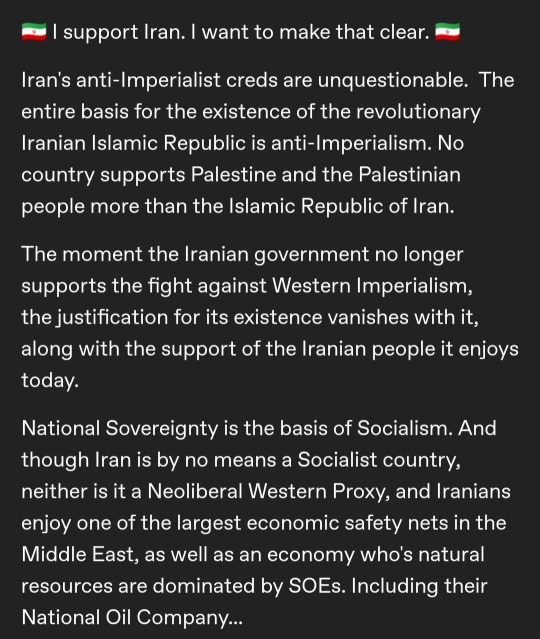
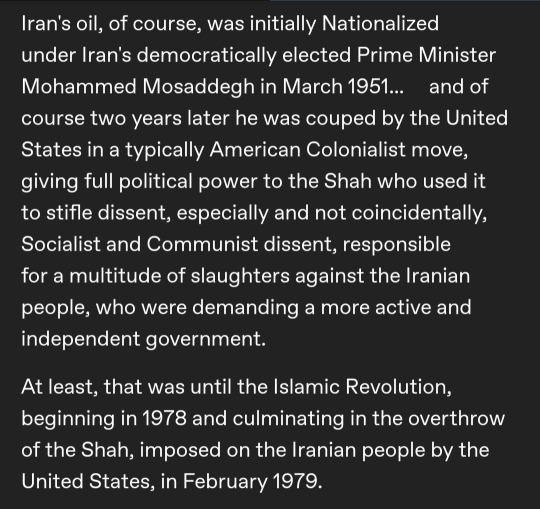
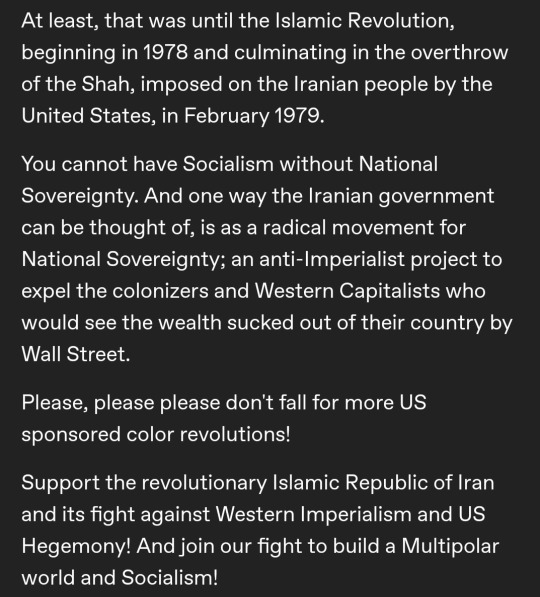
Some tankie bs detection
I saw this post on my dash. The user is blocked now. But just to educate people so that they won't fall for idiotic claims online, here are a couple of facts:
1. The Islamic Republic is not anti imperialist, they're anti USA. The regime is very much in love with Russian imperialism. At this point, Iran is an unofficial russian colony. And by the support of their imperialist father figure they have their small version of imperialism in middle east. Ask Iraq and Lebanon.
2. There's no "safety" when it comes to economy in Iran. The "national sovereignty" is called "those fvckin thieves in power" here. Iran's regime is one of the most corrupt regimes by international index. Rent, nepotism, embezzlement and money laundering are serious issues in Iran. Done only and only by the governors and people in power. Social class is not only a thing, there's a raging gap between rich people and those in poverty. And the gap is getting bigger and bigger by month. If you have connections in government or you are in the government, you'll get richer and richer. Other wise, soon enough you'll be in poverty too. Many families, including mine, who used to be considered middle class, have incomes lower than the poverty threshold now.
About 15% of Iran's economic failure including inflation is on the sanctions. The rest is on the corruption within the regime.
Iran's banking system is also a corrupted organ. The so called Islamic banking is anything but Islamic. The loan interest rate is one of the highest worldwide, 23%, so that often you have to pay back more than twice the money you've received. It's called Riba in Islam and it's Haram. According to the regime themselves, the banking system in European countries, even in the USA, is more Islamic than us. The fact that some of the biggest embezzlement in Iran has been done by bank managers should give you a picture of how they're drinking our blood.
None of this is on USA imperialism. It's all the Islamic Republic.
3. The Islamic Republic doesn't support Palestinians. The regime is extremely racist and anti Arab. I dare you talk about this with an actual Arab. IR don't give two shites about Palestinians lives. The regime is antisemitic. That's what they are. Palestine is just an excuse to attack Israel. In the past 20+ years of my life, living in Iran and dealing with these posers, not once we've been educated about Palestine and Palestinians lives. Everything I know, I've learned from online resources and documentaries make by Palestinians. The regime doesn't talk about Palestinians when they pose as supporters. I'm pretty sure they don't know or care to know anything noteworthy about Palestine, considering my knowledge of the human rights violations there is always more than basiji people of my country, and I don't even know that much. All the regime talks about is how Israel should be eliminated. IR supports a terrorist organization called Hamas, not Palestinians.
4. Let's forget about everything I said so far. I wonder if tankies like the op has any ounce of humanity in them! The regime has been oppressing women, violating every type of human rights and murdering lgbtq people and other-thinkers for the last 40 years. The spectacular environmental disaster in Iran is the direct result of regime's policies and neglect. This is a case of human rights violation since it's ruining people's lives, especially ethnic minorities, like Arab farmers in south.
No religious minority is safe in Iran, be it atheist, Baha'i, Jew, christian, or Sunni Muslim. They commit crime against children, through labor and through war. IRGC have little regards for human lives in general but it descent into no regards at all for ethnic minorities.
They have MASS EXECUTED 30,000 leftists (members of Marxist Communist parties and their supporters) within the first decade of their autocratic rule. It's unbelievably funny to me when foreign leftists support a regime that has executed many of their fellow thinkers and still arrest and torture any left activist in Iran.
To say the reason the 1979 revolution happened was to get rid of western influence and to establish a democratic free independent government is true. But the Islamic Republic is not that result. Don't be fooled.
#iran#iranian#iran revolution#iran protests#human rights#politics#lgbtq+#feminism#middle east#irgcterrorists#support iranian women#human rights violation#crimes against children#crimes against women#ethnic minorities#racism#russian imperialism#tw misogyny#tw racism#tw homophobia#environmental issues#background information
368 notes
·
View notes
Text
"In 1983, Islamic Republic of Iran hanged 10 Baha'i women in a single night in a square in the city of Shiraz. The women were hanged one by one, each forced to watch the next woman’s death in a harrowing attempt to coerce them into recanting their faith. The youngest one was 17."

4 notes
·
View notes
Text

World Flags Part 1: Asia / Sims 4 cc
It's Ready! World Flags Collection, Part 1: Asia
Includes flags from all the countries in Asia, as well as 13 bonus flags of various subdivisions and communities across the Asian continent. A sims 4 base game recolor item.
I have been downloading s4cc for many years now, and as far as I know there still hasn't been a flag recolor for every country in the world, so I have decided to take the project up myself :)
I will be releasing the flags per continent - part 2: Europe coming next. Enjoy!
Much love, Aviv
︵‿︵‿︵‿︵
Full list of Flags;
Countries: Afghanistan, Armenia, Azerbaijan, Bahrain, Bangladesh, Bhutan, Brunei, Cambodia, China, Cyprus, Georgia, India, Indonesia, Iran, Iraq, Israel, Japan, Jordan, Kazakhstan, Kuwait, Kyrgyzstan, Laos, Lebanon, Malaysia, Maldives, Mongolia, Myanmar, Nepal, North Korea, Oman, Pakistan, Palestine, Papua New Guinea, Philippines, Qatar, Saudi Arabia, Singapore, South Korea, Sri Lanka, Syria, Taiwan, Tajikistan, Thailand, Timor-Leste, Turkey, Turkmenistan, United Arab Emirates, Uzbekistan, Vietnam, Yemen.
& Bonus Flags: Kurdish, Alternate Syria - green, Yazidi, Hong Kong, Assyrian, Tibet, Sikh, Parsi, Xinjiang/Uyghur, Macau, Baha'i, Balochistan, Sakha Republic/Yakut.
︵‿︵‿︵‿︵
Download on Patreon / base game compatible
#s4cc#s4ccfinds#s4 custom content#s4mm#ts4cc#s4 recolor#s4cc download#s4cc free#s4ccart#s4ccdecor#s4ccwalldecor#s4ccwallart#s4ccinternational#s4ccflags#s4ccflag#s4ccasian#s4ccmiddleeastern#s4ccindian#s4ccasiandecor#s4ccworldflags#s4ccworld#s4cc furniture#s4cc buy#maxis match#ts4 urban cc#ts4 simblr#simblr#flags#s4ccessentials#s4cckurdish
9 notes
·
View notes
Text
Scholar Drops Truth Bomb on Ignorant, Protesting Students
Dr. Denis MacEoin was a British academic, scholar and writer with a focus on Persian, Arabic, and Islamic studies. He was an expert in Middle Eastern affairs and was a senior editor of the Middle East Quarterly.
The following is an open letter of rebuttal that he wrote to The Edinburgh Student's Association who voted to boycott Israel based on a claim that Israel is under an apartheid regime.

TO: The Committee Edinburgh University Student Association.
May I be permitted to say a few words to members of the EUSA? I am an Edinburgh graduate (MA 1975) who studied Persian, Arabic and Islamic History in Buccleuch Place under William Montgomery Watt and Laurence Elwell Sutton, two of Britain 's great Middle East experts in their day. I later went on to do a PhD at Cambridge and to teach Arabic and Islamic Studies at Newcastle University. Naturally, I am the author of several books and hundreds of articles in this field. I say all that to show that I am well informed in Middle Eastern affairs and that, for that reason, I am shocked and disheartened by the EUSA motion and vote.
I am shocked for a simple reason: there is not and has never been a system of apartheid in Israel.
That is not my opinion, that is fact that can be tested against reality by any Edinburgh student, should he or she choose to visit Israel to see for themselves. Let me spell this out, since I have the impression that those members of EUSA who voted for this motion are absolutely clueless in matters concerning Israel, and that they are, in all likelihood, the victims of extremely biased propaganda coming from the anti-Israel lobby.
Being anti-Israel is not in itself objectionable. But I'm not talking about ordinary criticism of Israel. I'm speaking of a hatred that permits itself no boundaries in the lies and myths it pours out. Thus, Israel is repeatedly referred to as a "Nazi" state. In what sense is this true, even as a metaphor? Where are the Israeli concentration camps? The einzatsgruppen? The SS? The Nuremberg Laws? The Final Solution? None of these things nor anything remotely resembling them exists in Israel, precisely because the Jews, more than anyone on earth, understand what Nazism stood for.
It is claimed that there has been an Israeli Holocaust in Gaza (or elsewhere). Where? When? No honest historian would treat that claim with anything but the contempt it deserves. But calling Jews Nazis and saying they have committed a Holocaust is as basic a way to subvert historical fact as anything I can think of.
Likewise apartheid. For apartheid to exist, there would have to be a situation that closely resembled how things were in South Africa under the apartheid regime. Unfortunately for those who believe this, a weekend in any part of Israel would be enough to show how ridiculous the claim is.
That a body of university students actually fell for this and voted on it is a sad comment on the state of modern education. The most obvious focus for apartheid would be the country's 20% Arab population. Under Israeli law, Arab Israelis have exactly the same rights as Jews or anyone else; Muslims have the same rights as Jews or Christians; Baha'is, severely persecuted in Iran, flourish in Israel, where they have their world center; Ahmadi Muslims, severely persecuted in Pakistan and elsewhere, are kept safe by Israel; the holy places of all religions are protected under a specific Israeli law. Arabs form 20% of the university population (an exact echo of their percentage in the general population).
In Iran, the Bahai's (the largest religious minority) are forbidden to study in any university or to run their own universities: why aren't your members boycotting Iran ? Arabs in Israel can go anywhere they want, unlike blacks in apartheid South Africa . They use public transport, they eat in restaurants, they go to swimming pools, they use libraries, they go to cinemas alongside Jews - something no blacks were able to do in South Africa.
Israeli hospitals not only treat Jews and Arabs, they also treat Palestinians from Gaza or the West Bank. On the same wards, in the same operating theatres.
In Israel , women have the same rights as men: there is no gender apartheid.
Gay men and women face no restrictions, and Palestinian gays often escape into Israel, knowing they may be killed at home.
It seems bizarre to me that LGBT groups call for a boycott of Israel and say nothing about countries like Iran , where gay men are hanged or stoned to death. That illustrates a mindset that beggars belief.
Intelligent students thinking it's better to be silent about regimes that kill gay people, but good to condemn the only country in the Middle East that rescues and protects gay people. Is that supposed to be a sick joke?
University is supposed to be about learning to use your brain, to think rationally, to examine evidence, to reach conclusions based on solid evidence, to compare sources, to weigh up one view against one or more others. If the best Edinburgh can now produce are students who have no idea how to do any of these things, then the future is bleak.
I do not object to well-documented criticism of Israel. I do object when supposedly intelligent people single the Jewish state out above states that are horrific in their treatment of their populations. We are going through the biggest upheaval in the Middle East since the 7th and 8th centuries, and it's clear that Arabs and Iranians are rebelling against terrifying regimes that fight back by killing their own citizens.
Israeli citizens, Jews and Arabs alike, do not rebel (though they are free to protest). Yet Edinburgh students mount no demonstrations and call for no boycotts against Libya, Bahrain, Saudi Arabia, Yemen, and Iran. They prefer to make false accusations against one of the world's freest countries, the only country in the Middle East that has taken in Darfur refugees, the only country in the Middle East that gives refuge to gay men and women, the only country in the Middle East that protects the Bahai's.... Need I go on?
The imbalance is perceptible, and it sheds no credit on anyone who voted for this boycott. I ask you to show some common sense. Get information from the Israeli embassy. Ask for some speakers. Listen to more than one side.
Do not make your minds up until you have given a fair hearing to both parties. You have a duty to your students, and that is to protect them from one-sided argument.
They are not at university to be propagandized. And they are certainly not there to be tricked into anti-Semitism by punishing one country among all the countries of the world, which happens to be the only Jewish state. If there had been a single Jewish state in the 1930's (which, sadly, there was not), don't you think Adolf Hitler would have decided to boycott it?
Your generation has a duty to ensure that the perennial racism of anti-Semitism never sets down roots among you. Today, however, there are clear signs that it has done so and is putting down more. You have a chance to avert a very great evil, simply by using reason and a sense of fair play. Please tell me that this makes sense. I have given you some of the evidence.
It's up to you to find out more.
Yours sincerely,
Denis MacEoin
5 notes
·
View notes
Text
Baha’is are the largest unrecognized religious minority in Iran. They have been the target of harsh, state-backed repression since their religion was established in the 19th century. After the 1979 revolution, Iranian authorities executed or forcibly disappeared hundreds of Baha’is, including their community leaders.
Thousands more have lost their jobs and pensions or were forced to leave their homes or country.
For the past four decades, the authorities’ serial violations of Baha’is’ rights have continued, directed by the state’s most senior officials and the Islamic Republic’s ideology, which holds extreme animus against adherents of the Baha’i faith. While the intensity of violations against Baha’is has varied over time, the authorities’ persecution of people who are members of this faith community has remained constant, impacting virtually every aspect of Baha’is’ private and public lives.
In recent years, as Iranian authorities have brutally repressed widespread protests demanding fundamental political, economic, and social change in the country, the authorities have also targeted Baha’is. Authorities have raided Baha’i homes, arrested dozens of Baha’i citizens and community leaders, and confiscated property owned by Baha’is.
Iranian authorities have intentionally and severely deprived Baha’is of their fundamental rights. Authorities have denied Baha’is’ their rights to freedom of religion and political representation. They have arbitrarily arrested and prosecuted members of the Baha’i community due to their faith. Authorities routinely trample on Baha’is’ rights to education, employment, property, and dignified burial.
The Islamic Republic’s repression of Baha’is, particularly after 1979, is enshrined in Iranian law and is official government policy.
Read the full report here.
#this is an INCREDIBLY thorough report#just WOW#never in my life did I expect to see something this detailed#iranian baha'is#baha'i faith#baha'is in iran#religious minorities in iran#religious persecution#state-sanctioned persecution#human rights watch
4 notes
·
View notes
Text
Every time I see something about how it's so horrible that people are just going about their lives when a genocide is happening in this day and age I just roll my eyes and scroll cause like
China is on stage 9 of genocide against Uyghur Muslims
Azerbaijan is on stages 8,9, and 10 of genocide against Armenians
Iran is on stage 8 of genocide against Sunni, Baha'i, LGBT+, Kurdish, and more
Rwanda is on stages 3,6 and 10 of genocide against the Tutsi people
the genocide in Yemen against Yemenis led by Saudi Arabia and backed by Iran and the UAE is on stages 9 and 10
Turkey is on stages 5,6, and 9 in a genocide against the Kurdish
Syria is on stage 9 in a genocide against the Kurdish
Egypt is on stage 8 of genocide against Coptic Christains
Canada is on stage 10 of genocide against Indigenous People
Israel is on stages 5,6, and 8 of genocide against Palestinians
It's great that y'all want to speak up about genocide happening, but stop acting like you haven't been ignoring so many well-documented genocides happening right now or in recent history cause this isn't even half of it.
also, all of this information is from Genocide Watch which seems to have last done all their updated reports in 2021 so some of this may have changed since then
11 notes
·
View notes
Text
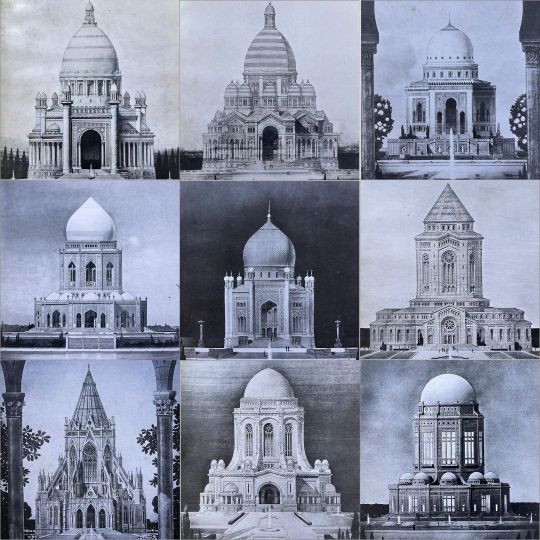
While working through our backlog of architectural books, we stumbled upon this intriguing piece of the history of the Baha’i Faith. The Baha’i Faith religion, originating in Iran in the nineteenth century, teaches the unified purpose of the major world religions. This 1917 publication details plans to construct the first Mashriqu'l-Adhkár (Baha’i house of worship) in the United States of America.

Bookplate of Charles Mason Remey
Charles Mason Remey (1874-1974) was an American architect who grew up in the Midwest and trained at Cornell and the École des Beaux-Arts. While studying in Paris, he learned about the Baha'i Faith from May Maxwell and became an adherent of the faith in 1899.
When Charles Mason Remey was making plans to construct the first American Baha’i temple, he didn’t have much in the way of precedent to guide him. At the time of publication in 1917, the first and only other temple in Ashgabat, Turkmenistan, was still two years away from completion. The Baha’i faithful had already settled on the location of the American temple in Wilmette, Illinois; in 1912, ʻAbdu'l-Bahá himself laid the cornerstone.
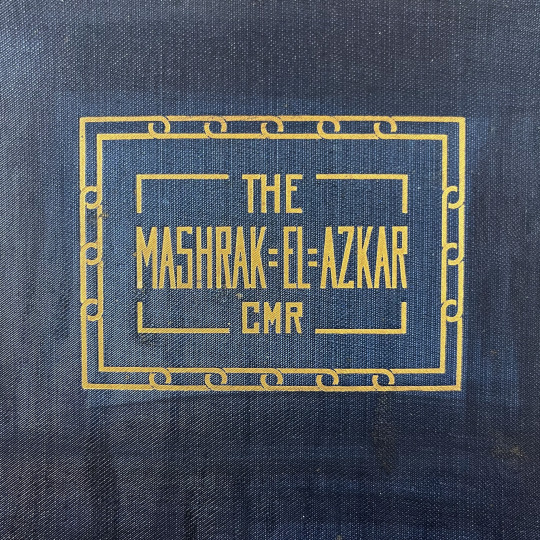
Front cover design
Remey put forth a variety of design styles for the house of worship, but one element–the repetition of the number nine–remained consistent. Why the number nine? In the Abjad numerical system in which Arabic letters correspond to numeric values, the letters in the word “baha” add up to nine. The founder of the Baha’i Faith, Ḥusayn-ʻAlí, took on the Arabic title “Baha” which translates to “glory” in English. Therefore, the number nine holds a sacred significance for members of the Baha’i Faith.
Charles Mason Remey even went so far as to propose nine different architectural styles for the American temple: Classical Roman, Byzantine, Arabian, Persian, Indian, Romanesque, Gothic, Renaissance, and Modern.
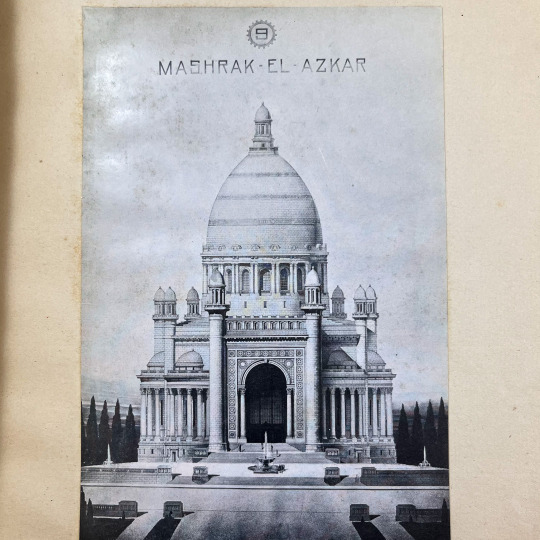
Style: Classical Roman
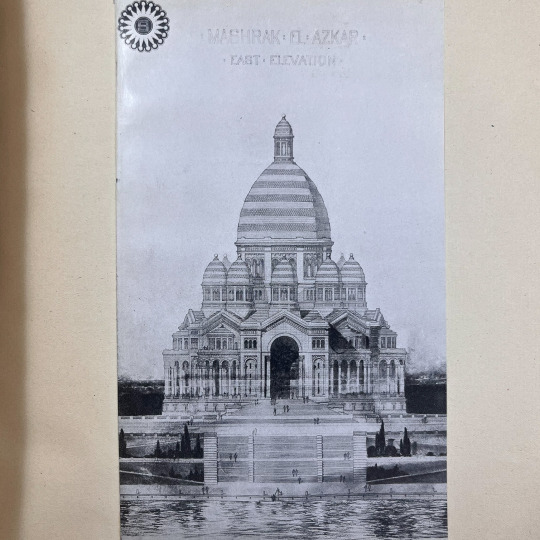
Style: Byzantine

Style: Arabian
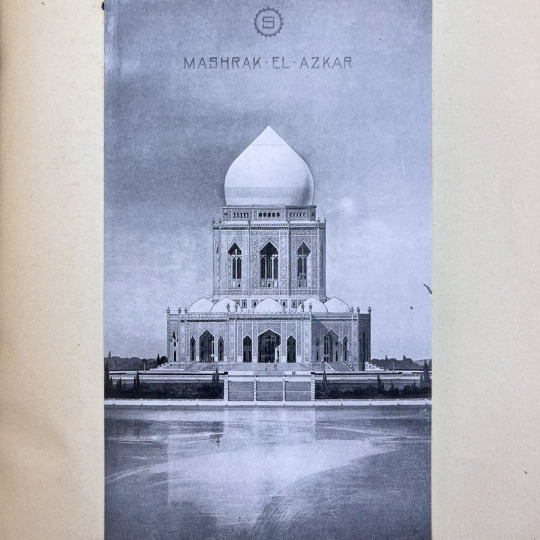
Style: Persian

Style: Indian
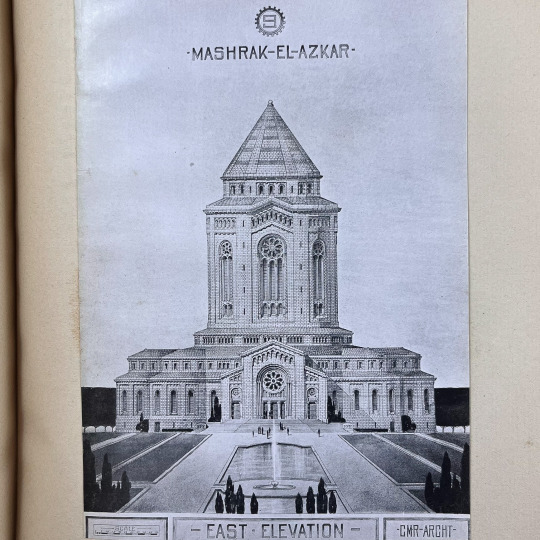
Style: Romanesque

Style: Gothic
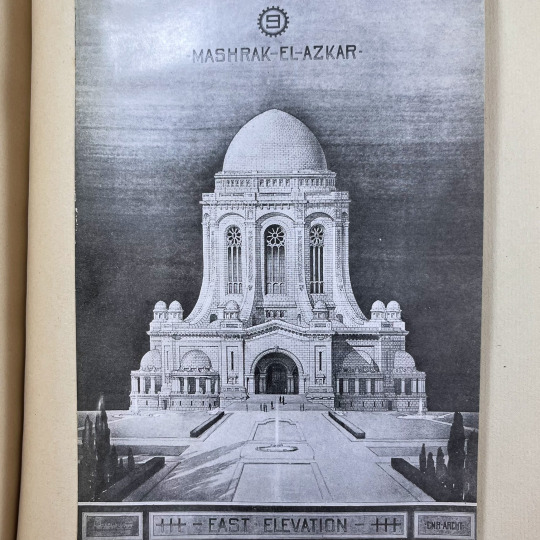
Style: Renaissance
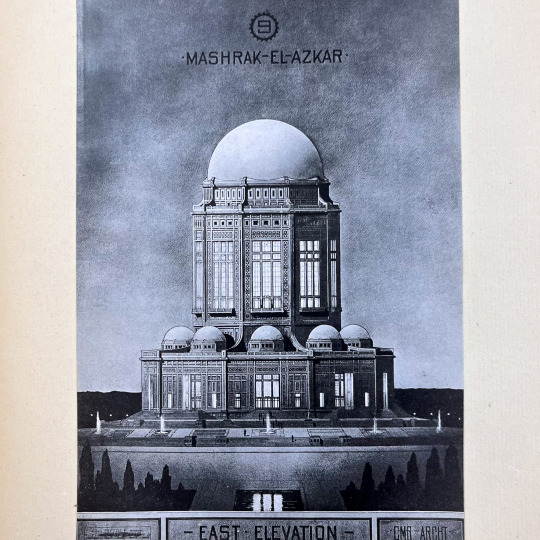
Style: Modern
In the end, Baha’i leaders went with the design of French-Canadian architect Louis Bourgeois; the Wilmette, IL, Mashriqu'l-Adhkár was completed in 1953 and still stands today. Remey did go on to build Baha’i temples in Kampala, Uganda, and Sydney, Australia, as well as the Baha’i International Archives building in Haifa, Israel. In 1960, after proclaiming himself the Guardian or the head of the Baha’i governing body, Remey was excommunicated and led a splinter group of followers for the remainder of his life.
Images from:
Remey, Charles Mason. Mashrak-el-Azkar: Descriptive of the Bahai Temple and Illustrative of an Exhibition of Preliminary Designs for the first Mashrak-el-Azkar to be built in America. Chicago: Bahai Publishing Society, 1917. Catalog record: http://bit.ly/3BfICj9
50 notes
·
View notes
Note
no pressure but what's it like being raised in the bahá'í faith? I've read a bit about it before and then just reread some stuff upon seeing ur tags and it actually speaks pretty well to how I describe my relationship with religion as a Catholic raised agnostic (I think that all religions hold potential truths and that there's not really a truly fully "correct" religion) so I'm curious what it's like to actually live with it/the practices & beliefs ^^
(heads up: this got a little long)
I'd imagine its quite similar to being raised in other beliefs--the beliefs themselves just vary.
For context, my family joined the baha'i faith when I was 5, and I stayed until I was 15--which is the official age you can decide for yourself, and I'd already figured out I was an atheist (though I never did the paperwork, so officially i'm still counted in the census). So I've got about 10 years experience in the faith, though I've never been a religious person
Like you said, the Baha'i faith thinks there is a truth to all religions. There's one God and every so often he sends a prophet to remind us of his teachings--Abraham, Mohammad, Jesus, etc. The most recent is Bahá’u’lláh, born about 200 years ago, which is who Baha'is follow now--and will until the next prophet.
The faith is huge on unity; it's like the core tenet. We are the fruits of one tree and the leaves of one branch, humanity is a collective so we should be uplifting and supporting everyone--including people we disagree with. Which meant it was a very kind and supportive environment focused on mutual aid and service. Trips to the food bank to volunteer, visits to each other when in need, that kind of thing
Like in other religions, we did things on Sundays, meeting at the Baha'i center. There we'd have the toddler's classes (up to age 5), children's classes (5-10), junior youth (11-15), and then the adult sessions (which I never went to myself); this way everything was in one building at the same time. So growing up that just meant I'd be busy Sunday mornings and had to plan around that.
Every 19 days would be a feast day, marking the start of another month (there are 19 months with 19 days each). These would typically be held at a member's house, and they'd house their sector. It's pot-luck style and there people would read prayers, listen to music, and talk about the value of the month (each month has a different value--we just ended Mulk/Dominion). Things like why it was important, in what ways, how to incorporate it into our lives for the next 19 days.
Also I should mention--the Baha'i community is rather small. The religion is only about 200 years old, so it's a rather close-knit community here. We were friends or at least friendly with practically everyone, and there were few kids, so we all knew each other and grew up kinda together.
Feast is held in the evening though, which means the most consistent attendees are the older people--parents with kids had to be conscious of bedtimes and whether it was a school night, so my family didn't attend all of them.
Then there'd be the Holy Days--Naw-Rúz (New Year), 1st, 9th, and 12th days of Ridván, the twins' (Bahá’u’lláh and the Báb) births and martyrdoms, etc. Then we'd all meet at the Baha'i Center in the evenings, where there'd be a program, music, praying, and then we'd go eat--which was also potluck, but on a bigger scale. The faith originated in Iran, so a good portion of the community is Persian and a lot of the food I grew up with there was, too.
I don't think this is too different from what other religions do, it's just the specific Holy Days and what/who we're remembering that's different.
What was different for me--and for a lot of non-christian/catholic raised kids was the constant underlying knowledge that you're different. You don't see your prayers, your symbols (nine pointed star is the main one), your holy figures, your practices anywhere. You make christmas crafts at school and think: this isn't actually my holiday, but here I am anyway. And there's this feeling of wanting to say something, to distinguish yourself because you know people are assuming you're christian/catholic otherwise. Because it's the default and you're an outlier.
I have never met a Baha'i person outside of the center, outside of the people I've known since I was 5. Nobody knows what the Baha'i faith is, what it's beliefs are. Everywhere I go it's with the knowledge there's a 99% chance I'm the only one in the room--and the thing is, I'm atheist. I don't believe in any god, and yet because the Baha'i faith is such a minority it's important for me to still maintain that connection that separates me from the assumptions people make. Every time it comes up, I'm already prepared to explain because I know no one else knows about it, so to be Baha'i or former Baha'i is to be an ambassador, a resource as much as I can be even with my limited experience--because it's also not a closed religion. They love to spread the teachings and get people attending. One of the times my family hosted feast my friends who lived down the street came and we competed to see who could say the most prayers (though stuff to do with budget and that kind of thing is a little more for members only)
I'm kinda jumping around to think of other info, apologies. There's a daily prayer facing Bahá’u’lláh's shrine once you're a Youth (above 15), and that's also when you start participating in the fast. During the month (19 days) of Ala, you don't eat from sunrise to sunset. There's also the pilgrimage to...Bahgdad? Haifa? No one in my family has taken it, so I can't remember the location off the top of my head, but the point is there are locations of importance (like shrines and temples) in that area of the world where Baha'is' goal is to visit at least once in their life. One of the other kids I knew did a year of service after high school and went on her pilgrimage before starting college.
This has gotten a little long so I'll wrap up here but that was generally what it was like/what was up. Very community and service focused, very warm and friendly. It just meant certain days I had things going on others didn't (attending the Naw-Rúz celebration that evening, for example), and that it was always something I knew was different about my life compared to the community I was in.
This answer feels quite scattered and eclectic, so if anyone has any follow up questions feel free to ask and I'll do my best to answer :)
#the baha'i faith#quil's queries#nonsie#i could tell you more about what we did in children's classes or share music or other things if you'd like#or share some of the writings/prayers and things like that#i am not the most knowledgeable former baha'i in the world because i was an atheist the whole time and didn't pay#as much attention as some of my peers#but. 10 years of weekly participation does leave me with SOMETHING#and I am more than willing to share for those who are interested
4 notes
·
View notes
Text
Another Violation of the Rights of Bahais in Iran
In this post, I provided some articles discussing a few of the many human rights abuses inflicted upon minorities in Iran, including Bahais. As a followup, here is yet another example of the cruel treatment of Bahais. On top of the stress and trauma of the loss of a loved one, people must be subjected to further pain by being barred from holding a proper burial. It's so heartbreaking.
SOURCE
#free iran#freedom for iran#woman life freedom#women life freedom#iran revolution#iran protests#human rights#bahai#religion#mahsa amini
12 notes
·
View notes
Text
Racism of the Islamic Republic regime
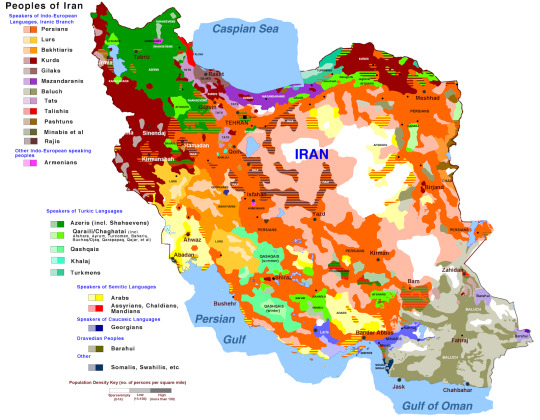
Something that has been neglected in topics of protests in Iran is racism. It is often left out of discussions by those of us in or outside of Iran who weren't the direct victims of these antihuman crimes. There's a huge difference between human rights violations in central Persian cities and border non-Persian ones. Persians and other ethnic groups who live in central areas are the targets of enough antihuman acts by this regime that shows the terrorist face of them, just imagine how everything is ×100 worse in non-central areas. Here are some examples:
Arabs in the south: it is estimated that more than 2 million Arabs live in iran. This ethnic minority is severely oppressed and violated. The regime has been capturing and executing Arabs and Arab activists with no clear reason other than being criminal dictators themselves, like how they've been violating and killing Kurds and Balochs in the past 4 decades. Many Arab families have been forcefully moved and pushed to corners, literally in a geographic sense. Racism exist in the Iranian populations like any other country and nation in the world. But it is promoted and supported by the regime. Jina revolution has brought this issue to attention and social activists are doing anti racist activism now, something that wasn't addressed enough before.
Kurds in the west: people of Kurd never accepted the authority of this regime and fought their forces with all their might. Many Kurds citizens and Kurd activists have been the victims of government murder or long imprisonments simply for being freedom fighters. Also, kurds are denied many legal and social rights in Iran, for example not getting hired by governmental organizations, unless they sell their souls to the regime. Because of this many highly educated Kurds can't find a job and they're forced into doing unrelated or illegal labor that often gets them killed. To understand the severity of this issue I recommend you read this article "koolbars new slaves" thoroughly.
Balochs in the east: people of Baloch are victims of the IR regime's racism towards our neighbors, Afghans and Pakistanis. The regime refuses to provide ID papers for Balochs with the excuse that they might be Afghan and not Iranian. The Balochistan province is kept extremely underdeveloped by the regime to the point that many people don't have drinking water there. Kurd and Arab cities are also kept underdeveloped even though most of those areas are rich with natural resources that could easily be used for development. Since many Baloch people are denied id papers they have no legal rights and the regime often gets away with whatever human rights violations, like executions, r*pe, and torture, they do there. Other than the issue of legal rights, the islamic republic had been very successful in isolating Balochistan and keeping the rest of the world including the rest of Iran of knowing who Balochs are and what is really going on in that region. Jina revolution has also brought the issues in Balochistan to attention.
Aside from these intentional neglects, the language and culture of these ethnicities are under attack by the regime.
Other ethnic groups in Iran face discrimination to different degrees by IR. One thing that plays a great role in the level of racism by the regime is religion. Sunni Muslims are very hated and suppressed by the Islamic Republic here. Therefore kurd cities with a majority of Sunni Muslim population face a worse fate than the majority of shia cities. The regime also spreads a lot of hate towards sunni Muslims by accusing them of fanaticism and animosity which used to work on the old shia religious population. Kurds, Balochs, Arab and Turkmens in Iran have the majority sunni Muslim population. They are also the most repressed. Apart from sunni Muslims, Jewish, Zoroastrian, Baha'i and christian believers face discrimination in different ways by the regime.
The only way a war against big criminal bullies like the Islamic Republic can be won is by coming together and unite as people regardless of race, religion, sexuality and gender. Something that seemed not possible 2 years ago but Jîna revolution showed us that it is very much a possibility. We still have a lot of work to do but people took the first step in unity and solidarity. I recommend you read the article below twice to see the dept of what's going on in Iran and why the Islamic Republic overthrow and this revolution is vital to many marginalized people:
#iran#iran protests#iran revolution#human rights#politics#feminism#middle east#mahsa amini#jina amini#women life freedom#jin jiyan azadi#kurds#kurdish#baluchi#arabic#racism#police brutality#irgcterrorists#intersectional feminism#background information
126 notes
·
View notes